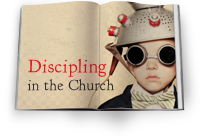Book Review: Godly Conversation: Rediscovering the Puritan Practice of Conference, by Joanne Jung
Caricatures of the Puritans are like social media platforms: they seem to multiply and spread so quickly that it’s hard to keep track of them all. One common slur on these seventeenth-century saints is that they were dour, hard-bitten individualists for whom the pinnacle of spiritual maturity was spending a week straight praying in private with no sleep, no food, and no human contact.
Happily, Joanne Jung’s recent book Godly Conversation: Rediscovering the Puritan Practice of Conference sets out to dispel this caricature and to learn from the Puritans about how Christians today can grow in community. And the book succeeds on both counts.
INVESTIGATING AND APPROPRIATING PURITAN “CONFERENCE”
Godly Conversation is an examination and appropriation of the Puritan practice of “conference”—intense conversation about Scripture and spiritual things among small groups of Christians. After a foreword by J.I. Packer and other introductory matter, the book begins with a survey of literature on Puritan spirituality in chapter 1. However necessary this chapter may have been for a PhD thesis, it is more of a hurdle than a doorway into the book in its present form.
Chapter 2 examines the historical origins of Puritan conference, which Jung says arose in the wake of the late sixteenth-century “prophesyings” which Queen Elizabeth sought to stamp out. Propheysings were meetings in which ministers would preach to each other, engage in theological debate, and discuss pastoral issues. Jung writes, “As supplemental, on-the-job training for the ‘godly clergy,’ it eased the transition from an academic training to a pastoral, preaching ministry” (34). As such, prophesyings furnish an attractive model for contemporary pastoral fellowship and training.
Chapters 3 and 4 provide an overview of Puritan attitudes toward the Word of God read and heard. This will be familiar ground for many, though readers who are newer to the Puritans may well be struck by the vigor of the Puritans’ commitment to the centrality of the Bible in the Christian life and in the church.
Chapter 5 then presents a detailed discussion of conference, including its goals, biblical basis, benefits, and format. Building on this, chapter 6 contains a schema of different types of conference: pastors with pastors, pastors with their sheep, conference among families, and so on. And chapter 7 applies the study to the present. In it Jung critiques the state of contemporary evangelical small groups and suggests how characteristics of Puritan conference could be used to inject new spiritual life into them.
LESSONS FOR PASTORS
Overall, Jung’s book is a helpful historical survey, and her suggestions for appropriating Puritan conference today are useful. One critique I’d offer is that I don’t think the “spiritual formation” paradigm she’s working within is uniformly helpful and trustworthy. For example, the most frequently cited contemporary authors in the book are Dallas Willard, Richard Foster, and Larry Crabb, and I’d have significant theological and pastoral reservations about recommending any of their works.
On a positive note, there are many lessons pastors can learn from the Puritans’ practice of conference as presented by Jung.
First, care for your fellow pastors’ souls—both your own pastoral team and other pastors in your community. Both conference and “prophesyings” offer great food for thought about how to do this.
Second, cultivate a culture of spiritual conversation in your church. Conference was not so much a program as a habit that flowed from the heart. Out of the overflow of the heart the mouth speaks, and many Puritans’ hearts were, to a remarkable extent, filled with heavenly things. So fill your people’s hearts and minds with the Word, and consistently model what it looks like for that Word to spill over into regular conversation and deliberate discipleship meetings.
Third, center discipleship—including small groups—on the Word. Puritan conference was remarkably Bible-driven. One of its primary goals was to increase all believers’ understanding of and ability to apply Scripture. So they provide a useful model of how to make the Bible central in our churches’ discipleship efforts.
Fourth, recognize how preaching and personal ministry mutually reinforce each other. This is one of the louder themes of chapter 7. For instance, in personal conference with their people, ministers could drive the Word home more specifically than they could in a sermon to the whole church, thus extending the reach of their sermon. As Richard Baxter said in a quote Jung returns to often, “I have found by experience, that some ignorant persons, who have been so long unprofitable hearers, have got more knowledge and remorse of conscience in half an hour’s close discourse, than they did from ten years public preaching” (132). Not only that, but what ministers would learn of their flock’s spiritual condition in these conferences crucially informed how they would explain and apply the Word to them in their weekly sermons. The better you know your people, the better you’ll preach to them.
WHY NOT GO TO THE SOURCE?
All that said, would I recommend the book? Perhaps. It certainly highlights helpful facets of Puritan practice and gestures toward their application today, which I’m all for.
But I’d be more likely to recommend that you simply go read the Puritans yourself. If you want to get a firsthand feel for Puritan conference, start with Thomas Watson’s work which Banner of Truth recently reprinted as The Great Gain of Godliness. Here’s a taste: “Speak of the preciousness of Christ: he is beauty and love; he has laid down his blood as the price of your redemption. Have you a friend who has redeemed you, and never speak of him?” (69).









